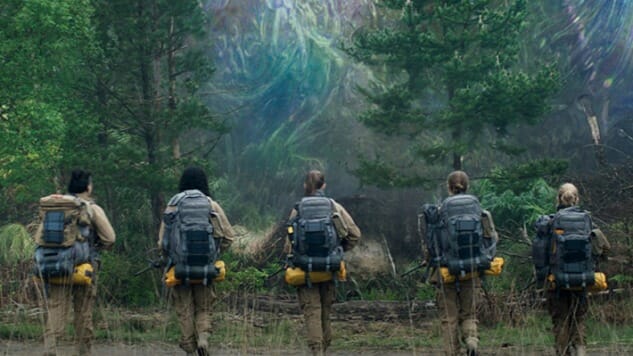When I left the theater after Annihilation, I was thinking about what science fiction does. Anyone who has read the first book of Jeff VanderMeer’s Southern Reach Trilogy, which the film was loosely adapted from, will tell you that the film is drastically different from the novel. Despite the film’s commitment to some pretty heady sci fi concepts, the book’s range is even wider, and any given reader-then-watcher would probably tell you that the choices that the film makes to pare the book down into something more filmlike was a work of necessity (whether they like that paring down or not). In thinking about the big ideas of science fiction, I started thinking about videogames. And I wondered why videogames don’t have their versions of Annihilation.
Don’t get me wrong: We have weird science fiction games. We have Prey and Dead Space in the big-budget arena, and we have a whole host of interesting sci fi games like Primordia and Waking Mars in the world of independent production. And yet, short of Prey itself, I have a hard time thinking of games that do the same kind of work that Annihilation does as a film. I can’t think of many games (and my sampling goes pretty deep) that truly do broad thinking comparable to the best works of filmed or written science fiction.
What I mean by that is that the best sci fi work constantly troubles what we think we know. By extrapolating our current society into the future or by introducing a new, unknown thing that changes human life, science fiction often makes us strange to ourselves. It can function as a kind of bizarre mirror that makes us see our actions in relief, contextualized, and we can use that reflection as a way of getting a handle on what we’re doing.
Without spoiling anything, I feel confident in saying that Annihilation asks us to interrogate what makes us us, and more importantly, if we can deal with any significant alterations to our identities and subjectivities. Politically, we are living during a time when a number of major democracies are swinging rightward and implementing nationalist, far-right policies of social control. Global warming is getting worse faster than we had anticipated, threatening drought, rising sea levels, and the destruction of inhabited land all over the planet. Racist policies of social and economic exclusion continue to exist and be enforced in even the most “enlightened” countries. Shit is bad, and getting worse, and the way that we live our lives is going to fundamentally change in the coming years. We’re living in the middle of it now, and it’s slow, but it’s happening.
And Annihilation stages this as a kind of metaphysical, pseudo-scientific set of questions about what makes me me or you you or a plant itself. It puts these question into the familiar format of CGI special effects and horror film violence and close-up shots of intriguing dialogue being spoken to the camera as much as to the other characters. But it’s hard to walk away from the film and not understand that it was less about what you saw onscreen and more about the ideas that you’re taking away from the argument that those images are making. No one speaks the moral of the story, but when the film closes out, it’s been communicated to an almost-excruciating degree.
I don’t know where this is in our videogames. I’ve heard so much about the storytelling power of games to change the world, but I haven’t played many things that have made me feel changed. Science fiction videogames seem to still be largely stuck in a whiz-bang-pow model of science fiction as a skin for other mechanics, or worse, in the space opera format that mistakes extremely detailed descriptions of star ships and guns as substance. And I like those things, in their own way, but I don’t have any illusions that the science fiction that we see most often in games, in Halo or Gears of War or our most futuristic Call of Dutys, is doing the same kind of work as a novel by Ursula Le Guin, Felix Gilman or Samuel Delany.
When I watched Annihilation, I was thinking about how wonderfully cinema was being used to communicate how small, how strange, and how contingent our lives are as a species. It made me consider me. And here I am, supposedly living in the middle of a ludic century where games are going to take hold of creativity and possibility, and the best I can do in the realm of weird thinking is the occasional cyberpunk tactical game or mind-bending roguelike. Give me our Annihilation. I’m ready for it.
Cameron Kunzelman tweets at @ckunzelman and writes about games at thiscageisworms.com. His latest game, Epanalepsis, was released last year. It’s available on Steam.